- Home
- Rosanne Hawke
Jehan and the Quest of the Lost Dog Page 2
Jehan and the Quest of the Lost Dog Read online
Page 2
‘Hei! I’m going to drown.’
Jehan closed his eyes to pray, then opened them again.
It wasn’t a dream.
The water was still there – the biggest flood he had seen in his life. The Indus River had become a sea.
He curled up into a tiny ball and cried for his parents and Amir.
When Jehan next woke the flood was flowing fast below the ropes of his charpai, making some of the tree’s branches sway underwater.
There was a rustling in the leaves above him. Then a chatter further away. Monkeys? A rat? Rats chewed people’s ears. He covered his head with the torn razai. But he still heard a raspy slither further up the tree. He shivered. Everything had climbed the tree to escape the flood. He hoped nothing decided he was good to eat.
If Amir were here he wouldn’t feel so scared. Jehan’s stomach clenched. He had not been a good brother. If only he had held on to Amir. If only he could find him, then he’d never get cross with him again.
He kept picturing Amir screaming and how their parents couldn’t reach them. The water had come too fast. Mr Nadeem had been right.
Jehan remembered clinging to the charpai, even when the water and debris tried to drag him off. He had closed his eyes, praying the charpai wouldn’t fall down a waterfall, and then, when he didn’t think he could hold on much longer, everything went black. And he had woken up in the tree.
He wanted to float the charpai back to get Amir and find his parents. But he realised it couldn’t be done. The floodwaters were so strong that he’d be swept away. He must already be a long distance from his village. What had happened to it? Was it under all that water? Had it been raining constantly for days? Jehan didn’t know.
When he looked out all he could see were the tops of other trees close by and some islands further away. But he couldn’t see any landmarks like factory chimneys or electrical towers. He recognised nothing. The river must have spread a long way from its true path.
Beyond, the sky looked too cloudy and misty for rescue helicopters to fly. And the water was too dangerous for boats. There was so much water and he couldn’t swim. It would take ages for all that water to subside.
Jehan knew he was in trouble. He may be stuck in the tree for a long time. By himself. He gulped down a sob and wished he was home.
Jehan moved, trying to find shelter under the leaves from the rain. The charpai teetered.
‘Hei!’ he cried as the charpai shifted again, sliding further down the trunk.
Jehan clung to the wooden frame, his nose grazing the thin rope of the base. He stared at the angry water swirling below. If he reached out his hand he would be able to touch it.
He needed to secure the charpai so he could have a safer place to sleep. At any moment he could be dumped into the flood. But what could he do?
Jehan’s father made charpais. People said his charpais were the best. They even came from other villages to buy them. Last year Jehan had made a miniature one with his father. He had sat whittling the legs out of scraps of wood. Then he had strung the frame, securing string with a knot at each end and weaving it back and forth, creating patterns, just like his father showed him.
If only he could get enough rope from the charpai to secure it to the tree.
For the next hour, Jehan worked at a knot at one end of the charpai until it unravelled. The charpai shuddered as he crawled carefully to the other end to undo another knot. He couldn’t take too much rope from the charpai or he would fall through to the water, but eventually he had just enough.
He glanced around him. Could he tie the rope to the next branch? It was too far away to reach. He put the rope between his teeth, took a deep breath and leaped. His right hand slipped on the wet branch, but his left held firm. With his heart drumming he pulled himself up and crept along the branch to a fork. He threw the rope over and tied a knot like his father had taught him.
Jehan edged back to the charpai and carefully put his foot on it. It creaked but didn’t shift.
‘Accha, good.’ He was glad to have the charpai. If he closed his eyes he could imagine himself lying on it with Amir at home.
A sudden screech made him glance up. A monkey sat on the branch above.
‘Go away!’ Jehan yelled.
The monkey bared its teeth and chattered. It held something yellow in its hand. It looked like food. Jehan’s stomach gurgled. He wasn’t sure how long it had been since his last meal, but it felt longer than a few days.
Jehan waved his arms at the monkey and it jumped to the next tree, dropping the yellow thing onto the charpai.
Jehan inspected the monkey’s gift. It was a mango seed. But no flesh was left for Jehan – it had been sucked dry.
He checked the leaves beside him and whooped. They were shiny, dark-green, and as long as his arm. He had landed in a mango tree!
He looked further up the tree, searching among the leaves for more fruit. But he couldn’t see any. So how did the monkey find one?
Then he caught a glimpse of yellow far above. Would he be able to climb that far? The gurgle in his stomach convinced him. It was so high the branch swayed when he clambered up.
He stilled until the branch stopped wobbling, then he reached for it.
Suddenly there was a whoosh. ‘Hei!’ He swung backwards as a huge bird grabbed the fruit from his hand and flew off.
Jehan got such a fright that he lost his grip on the branch. He fell. He tried to grab anything on the way down, but came away with leaves instead.
‘Ow!’ He landed on the charpai with a whump. It swung under his weight.
Jehan burst into tears but then gulped back his sobs. He couldn’t despair if he wanted to find his family again.
He heard his mother’s blessing echo in his head: Remember that even in difficult times Khuda is always with us.
Jehan shouted to the monkeys and birds, ‘I won’t give up!’
Lali sat at the edge of the roof watching the water fall from the sky. The air was so thick she could no longer see the chimney.
The big-water smelled strange. It flowed so fast it was difficult for her to hold smells in her nose. She hadn’t eaten for a few days now.
Finally, she sensed life. Lali dived off the roof.
The water took her where she didn’t want to go, dumping her under. She surfaced and learned to paddle across the current so she wasn’t swept too far away from her pups.
She swam and swam until she scented a winger.
Beti didn’t let Lali catch wingers, but Lali was too hungry to obey. She paddled behind it, ready to pounce, but the winger flew out of her reach.
Wood and branches swept by, bumping into Lali. A small black animal floated across her path. She grabbed it in her jaws.
It was a tough-tail.
It took all of Lali’s strength to return to her pups. When she reached the roof the tough-tail had drowned. She sat and ate it, leaving only the tail. Then she flopped into the box to feed her pups and soon fell asleep.
The next day, Lali sat at the edge of the roof again to watch for Beti. Surely when the water stopped falling she would return.
Lali howled. She would sit here and wait.
Jehan wasn’t sure how long it had been since he was first swept away, but he would start counting the days from now on. He used a pointy stick to make a scratch on the charpai. Then he added three more.
He held the stick in one hand and climbed up the tree. On the highest branch that could take his weight, he checked under the leaves. He could hear chatters in the next tree. Monkeys. He would have to be quick.
He moved the leaves aside with the stick and caught a flash of yellow.
A mango.
The chattering swung closer. There was a monkey right behind him.
Quickly, he reached up and twisted the mango. But he wasn’t careful enough. Sap spilled
onto his hand. ‘Ow!’ His mother had warned not to get the caustic sap on his skin.
The monkey leaped to grab it, but Jehan brandished the stick and caught the mango as it fell. The monkey bared its teeth.
‘This isn’t your tree, bandar,’ Jehan said to the monkey. Its tail curled around a branch. ‘We have to share now.’
Jehan peeled the skin from the fruit and shoved the flesh into his mouth. His stomach burbled. It was the juiciest mango he’d ever tasted. ‘Accha, it’s good.’
Another monkey joined the first one. It pointed at Jehan.
Jehan finished the mango, then held out the seed to the monkeys. They sat still, regarding him. Then the bigger one sprang upward, grabbing the seed as it went. The second one followed, and they sat above Jehan taking turns to slurp the seed.
A few days later in the steamy heat of the afternoon, Jehan lay on the charpai, swatting mosquitoes and thinking of fetching pani from the canal. When it was raining he’d caught water by cupping the leaves, then channelling it into his mouth. But the rain had stopped that morning. What could he do now? He was so thirsty, yet he couldn’t drink the floodwater.
Now that the weather had settled down he hoped to see someone. There weren’t so many clouds anymore, but the water was brown and murky. And it stank of rubbish and dead things. All day he’d scrutinised the little islands in the distance. But there were no boats and no people. Was he the only person who had survived?
He turned over and watched the current. It didn’t flow as fast or as high but it still spread to the horizon.
Suddenly something red bobbed by the tree. He drew it closer with his stick. A ball? No, a pomegranate.
‘Wah!’
He scooped it up and ripped it in half with his fingernails. Pomegranates always took Jehan ages to eat. He sucked each seed then spat it in the water. Now he could use the skin halves as cups to collect water when it rained at night. He checked for more flotsam. What would he find next?
By that afternoon he had also hooked a plastic bag, a blue shalwar about his size, a qameez, a multi-coloured hat, a homemade cricket bat longer than Badil’s, and more rope. The last thing he pulled in was a tablecloth. It was green like his razai and reminded him of the warm razais his mother made with her sewing machine. He used to help her stuff them with cotton, but he’d always wished he was outside playing cricket with Badil and Amir instead. Now he would do anything to be at home stuffing a razai for his mother.
Bang!
Jehan jumped as the tree shuddered.
‘What was that?’ he exclaimed, looking down.
A tin boat bobbed against the trunk. No, not quite a boat.
‘Wah, a bath!’
Maybe he could sail it to find his family. ‘But I don’t have a sail.’
Mr Nadeem had sailed boats in Karachi. He had told their class about the sea, yachts and motorboats. It had made Jehan want to ride on a fast boat.
Jehan checked the length of his new piece of rope. ‘If I can secure the boat, there should be enough rope to float out from the tree to salvage more things.’ He spoke aloud so he didn’t feel alone.
The tin bath scraped against the tree and shifted. He had to act quickly before it floated away.
After tying one end of the rope around a branch, he climbed down to the water with the rest of the rope coiled over his shoulder. Holding tightly to the trunk, he stretched out one leg and used his foot to pull the bath closer. Then he placed both feet into the bath and lowered his body weight. It wobbled so much that he toppled onto his bottom. He sat, holding on to both sides, until eventually the bath stopped swaying. Finally, he tied the rope through the bath’s handle with a knot that would make his father proud.
Jehan grinned.
He drifted away from the tree as far as the length of rope would allow. It felt like an excursion to Jehan. He watched the debris and noticed a can floating past. Quickly he scooped it up. It was hard to tell what was inside because the flood had ripped off the label. He shook it. Sounded like liquid. It didn’t have a ring to open the lid, so he would stash it in the plastic bag with his other salvaged items. These things were his currency to barter with if he ever saw anyone again.
As the bath bobbled, he watched the sun’s rays shine through the water below. He thought he saw a flat roof of a cement house. It made him feel strange: he could be floating above someone’s garden and living in their tree.
Just then something rose from below. It looked like a baby. His heart raced as he reached for it.
‘Nay, it’s a gudiya.’
He exhaled with relief. A doll would be good to barter with. But it was gone. The river moved it on.
The clouds on the horizon blushed pink and orange as the sun sank. He pulled on the rope to draw the bath to the tree, tied it up and climbed back to his charpai. It soothed Jehan to see the bath dipping on the water. Plus he now had another way to catch rain.
If he had oars, he could use the bath as a boat. Then he could find his family. Jehan looked out at the expanse of water and shook his head. It was too dangerous. He would have to stay in the tree until help came.
Their mother used to tell him and Amir to sing even if they didn’t feel like it.
‘Choose to be happy,’ she’d say. ‘Be thankful.’
What could he be thankful for? That he was alive?
He could hear his mother’s ‘Ji’ in his mind, and see her head tilt to the side.
‘I’m thankful for the bath,’ he said.
So he sang his mother’s favourite song ‘Khushi khushi, be happy’ until he drifted off to sleep.
Every day Lali tested the air from the roof before jumping into the big-water.
Food was hard to find but since the water from the sky had stopped falling during the day, swimming was easier.
Many dogs swam in the big-water now, searching, like Lali, for tough-tails and wingers.
That morning, Lali headed toward a creature splashing. So did a male dog. She could scent him.
Lali paddled faster. It smelled like a tough-tail. She must catch it. She reached it first and grabbed it.
The male bit her and snarled. Then he stole the tough-tail right from her mouth.
Lali barked but the dog didn’t listen. He carried his prize away.
Whack!
Something hit Lali on the tail. She looked up and saw a two-legger male in a boat with a long stick. He made loud, angry sounds, so she knew he wasn’t worth obeying.
She turned to paddle away, but she was too slow. The stick struck her again on the head.
Lali sank.
She felt like sleeping. She floated deeper and deeper. She thought of her pups. She thought of Beti. The two-legger girl still hadn’t come home. Lali must find her.
She surfaced, shaking her head. The boat was gone.
Lali swam but her legs didn’t move as fast as before.
She smelled the air. Which way was home? For the first time she couldn’t tell.
Her head hurt and she was so tired that she let the current carry her away.
She had lost her roof.
And her pups.
Jehan was lying on the charpai, dreaming of a dog. The dog was barking for him to help. It was caught in a wooden cage and couldn’t free itself.
Jehan opened his eyes and stared at the marks on the charpai. It had been eleven days now, and he was still living in the tree.
Suddenly he realised he could still hear barking. It wasn’t a dream! He sat up. The sound came from the northern side of the tree.
His heart thumped as he swiftly climbed to the top and looked out. He squinted against the glare of the midday sun. A few birds flew high, circling above the brownish-grey water. In the distance he could see a tiny island. Standing on it was a dog.
‘Kutta,’ he whispered.
Jehan had to
help the dog, but he knew the rope on his bath wouldn’t stretch that far. Dangerous or not, he would have to untie his rope and row out to the dog.
He shimmied down to the charpai looking for something that he could use as an oar.
A branch? ‘Nay, too heavy.’
His stick? ‘Nay, not long enough.’
His gaze fell on the homemade cricket bat. It was a long, flat piece of wood with a shaped handle. ‘That should work as a paddle!’
The dog howled.
Jehan dropped into the bath with the cricket bat, landing in the right spot so the bath didn’t topple. He hesitated, wishing he didn’t have such a flutter in his middle. This would be his first time in the bath without a safety rope. What if he wasn’t strong enough to row across the current?
Then the dog started barking again. That convinced him. Taking a deep breath, he yanked the rope into the bath and pushed away from the mango tree.
But the bath began drifting in the opposite direction.
Frantically, Jehan paddled with the bat.
‘Left. Right. Left. Right,’ he chanted over and over, and soon the bath was headed in the dog’s direction. His arms were aching already, but if he hesitated for a second he lost much of the distance he had gained. He navigated around a few mounds of rubbish until he reached an area clear of trees.
He was halfway when the dog saw him. It ran up and down the small stretch of land, barking. Jehan hoped it didn’t swim out to him. He couldn’t pull a dog in the bath without capsizing. And without any tree branches to grab, Jehan would drown for sure.
Jehan kneeled so he could paddle better. Soon the dog was so close that Jehan could see its golden-brown eyes. It looked scared.
‘Teik hai, it’s okay,’ Jehan called.
The bath washed against the tiny island and Jehan dug the bat into the dirt to ground it.
‘Ao, come.’
But the dog cowered and Jehan noticed blood on the side of its head. He could see it was female. She looked a lot like his uncle’s dog with red-brown fur and an intelligent face. Like a golden retriever cross.

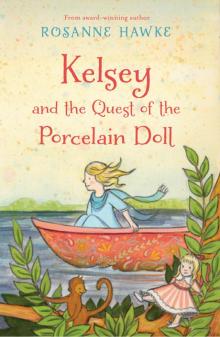 Kelsey and the Quest of the Porcelain Doll
Kelsey and the Quest of the Porcelain Doll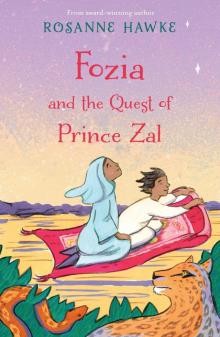 Fozia and the Quest of Prince Zal
Fozia and the Quest of Prince Zal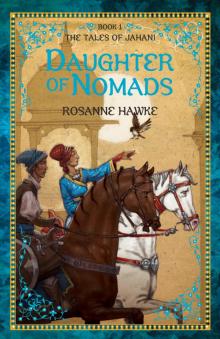 Daughter of Nomads
Daughter of Nomads The Truth About Peacock Blue
The Truth About Peacock Blue Taj and the Great Camel Trek
Taj and the Great Camel Trek The War Within
The War Within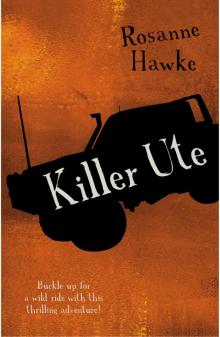 Killer Ute
Killer Ute Shahana
Shahana Kerenza: A New Australian
Kerenza: A New Australian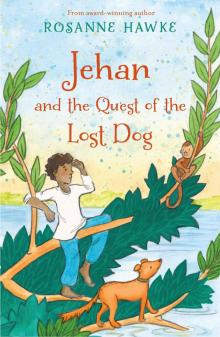 Jehan and the Quest of the Lost Dog
Jehan and the Quest of the Lost Dog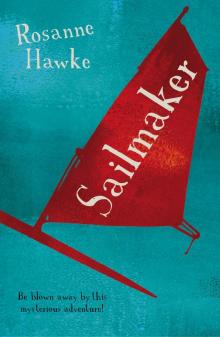 Sailmaker
Sailmaker Zenna Dare
Zenna Dare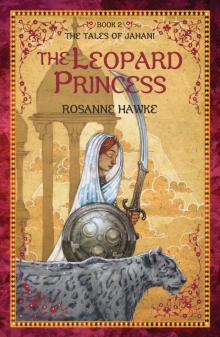 The Leopard Princess
The Leopard Princess Dear Pakistan
Dear Pakistan Marrying Ameera
Marrying Ameera Finding Kerra
Finding Kerra Spirit of a Mountain Wolf
Spirit of a Mountain Wolf